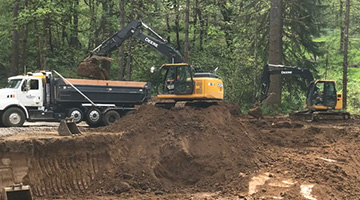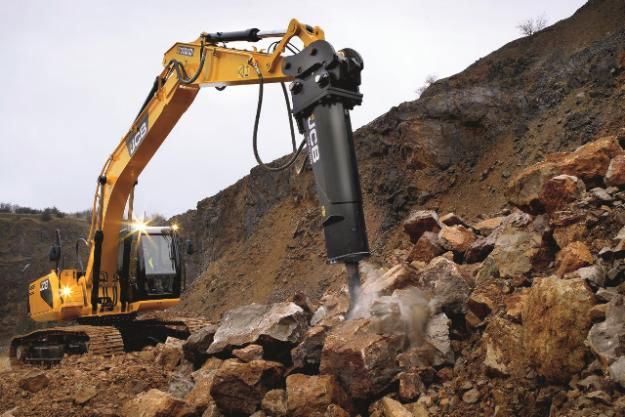Finest Dump Truck Companies in Ohio - Top-Rated Dump Truck Providers
Wiki Article
Comprehensive Excavation Strategies: Grasping the Fundamentals for Success
In the realm of building and construction and civil engineering, the significance of efficient excavation methods can not be overstated. The mindful planning, accurate implementation, and precise focus to information called for in excavation jobs require an extensive strategy that encompasses numerous basic facets. From first soil analysis to the implementation of safety steps and routine development tracking, grasping these core aspects is necessary for attaining success in any kind of excavation undertaking. The true proficiency exists not simply in comprehending these principles yet in seamlessly integrating them to navigate the intricacies of excavation tasks with skill.Understanding Excavation Task Planning

Successful excavation projects are developed on the structure of precise and comprehensive planning. The initial stage of any kind of excavation task is the planning stage, where essential decisions are made that can dramatically impact the result of the task. During this stage, it is vital to gather all appropriate details about the site, consisting of topographical studies, soil composition, and any type of possible risks that may exist. Recognizing the project range, timeline, and spending plan restraints is essential for producing a thorough excavation plan that makes sure the task's success.
One secret aspect of excavation project planning is the development of an in-depth timeline that describes the sequence of tasks, target dates, and turning points. This timeline serves as a roadmap for the task group, enabling them to track development and make necessary changes to guarantee the project remains on timetable. In addition, a distinct budget plan that represents all expenses, including tools rental, labor costs, and materials, is vital for preventing cost overruns and hold-ups. By very carefully thinking about all these elements during the preparation stage, excavation tasks can be performed successfully and successfully, leading to effective outcomes.
Soil Analysis and Site Assessment
Carrying out extensive soil evaluation and site evaluation is a critical step in the preparation phase of any kind of excavation project. Soil analysis includes establishing the structure, framework, and homes of the dirt at the excavation website. This info is important for recognizing the dirt's bearing ability, dampness web content, and possibility for disintegration, which are vital consider identifying the excavation methods and equipment required for the project.Website analysis surpasses dirt evaluation and encompasses a wider evaluation of the overall site problems. This evaluation consists of identifying any type of potential risks, such as below ground utilities, environmental concerns, or unsteady terrain, that could affect the excavation procedure. By extensively evaluating the website, project supervisors can develop reliable excavation methods that focus on security, performance, and ecological defense.
Making use of innovative modern technologies like ground-penetrating radar, dirt tasting, and drone studies can enhance the accuracy and efficiency of dirt analysis and site assessment. Investing time and resources in these initial actions can inevitably save time and prevent pricey hold-ups or difficulties during the excavation procedure.
Tools Selection and Use
Efficient excavation jobs depend greatly on calculated devices selection and utilization to guarantee optimum efficiency and productivity. Picking the best equipment for the work is critical in taking full advantage of effectiveness and lessening downtime. Elements such as the kind of dirt, depth of excavation, and job range play a significant duty in determining the most ideal tools for the task handy.
In enhancement to selecting the ideal equipment, appropriate use is vital to job success. Operators has to be trained to handle the equipment safely and effectively - lancaster excavation. Routine maintenance checks and prompt repair work assist protect against breakdowns and ensure constant performance throughout the task
Safety Procedures and Regulations Conformity
lancaster excavation In the realm of excavation projects, focusing on precaution and conformity with laws is extremely important to making sure a safe and legally audio operational environment. Security steps incorporate a variety of techniques, consisting of carrying out extensive site analyses, executing proper signs and barriers, and supplying adequate safety and security training for all personnel associated with the excavation process. Adherence to laws, such as OSHA requirements in the USA, makes sure that the excavation project satisfies the required criteria to safeguard employees, bystanders, and the surrounding atmosphere.
Monitoring Progression and Adjusting Methods
Exactly how can project supervisors successfully track the development of excavation projects and adjust their techniques accordingly to enhance outcomes? Surveillance development is important for ensuring that excavation jobs stay on track and fulfill due dates. Project supervisors can utilize numerous tools and strategies to track progress, such as day-to-day report card, routine site inspections, and advanced surveillance modern technologies like drones and GPS tracking systems. By continually monitoring the job's advancement, managers can identify any prospective hold-ups or issues beforehand and take proactive procedures to address them.
Verdict
In final thought, mastering the principles of extensive excavation strategies is crucial for the success of any type of project. By recognizing job preparation, examining dirt and website problems, choosing appropriate devices, following security regulations, and checking development, task managers can make certain a reliable and smooth excavation process. Carrying out these strategies will bring about successful results and minimize prospective threats or setbacks during the excavation project.
The initial stage of any kind of excavation project is the planning phase, where critical decisions are made that can dramatically affect the result of the task. Recognizing the project timeline, range, and budget plan constraints is vital for developing an extensive excavation strategy that makes certain the task's success.
How can project supervisors effectively track the advancement of excavation tasks and adapt their methods as necessary to optimize end results? By closely monitoring progress and being prepared to adjust strategies, job managers can boost the general success of excavation tasks.
By understanding job planning, analyzing dirt and website problems, picking appropriate equipment, conforming with safety and security laws, and keeping track of progress, project supervisors can make certain a reliable and smooth excavation process.
Report this wiki page